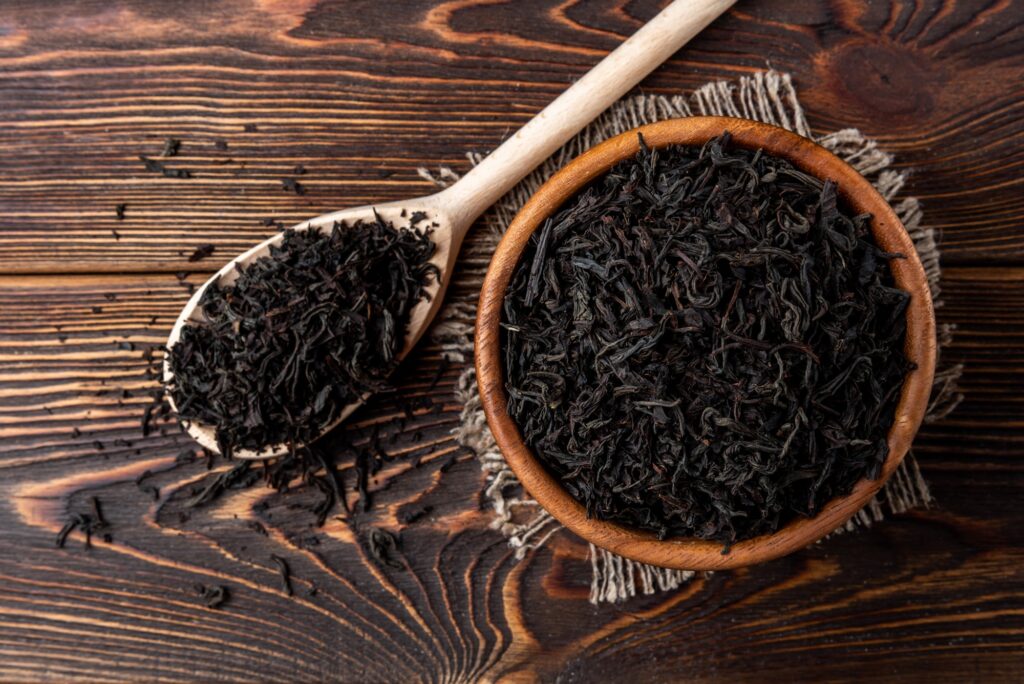
Black tea, one of the world’s most cherished beverages, has been a staple in many cultures for centuries. Originating from the Camellia sinensis plant, black tea is known for its rich, dark colour, robust flavour, and invigorating aroma. The process of making black tea involves fully oxidizing the tea leaves, which gives it a distinctive taste and higher caffeine content compared to other types of tea.
The popularity of black tea is not just limited to its delightful taste. Many people cherish this beverage for its potential health benefits, such as boosting heart health, reducing the risk of stroke, and improving gut health. However, one of the key factors that makes black tea a go-to morning beverage for many is its caffeine content.
Caffeine, a natural stimulant found in black tea, has been associated with increased alertness and improved cognitive function. However, the amount of caffeine in black tea varies and can be influenced by several factors. This guide will delve into black tea caffeine content, its effects on health, and how to manage its intake.
What is Caffeine?
Caffeine is a naturally occurring stimulant found in the leaves, seeds, and fruits of more than 60 plant species worldwide. It is most commonly found in coffee, tea, and cocoa plants. Caffeine stimulates the central nervous system, causing increased alertness and reduced fatigue. It is the world’s most widely consumed psychoactive substance, but unlike many other psychoactive substances, it is legal and unregulated in nearly all parts of the world.
The effects of caffeine can start as early as 15 minutes after ingestion and last up to six hours. Caffeine can have both positive and negative impacts on health, depending on the amount consumed and individual sensitivity. Some people may experience restlessness, insomnia, and rapid heartbeat with high caffeine intake, while others may benefit from improved mood, reduced fatigue, and enhanced cognitive function.
Understanding the caffeine content in various beverages, including black tea, can help individuals manage their intake and enjoy the benefits of this natural stimulant without experiencing adverse side effects.
The Caffeine Content in Black Tea
Black tea is well-known for its higher caffeine content compared to most other teas. However, the caffeine content in black tea is still less than that found in coffee. On average, an eight-ounce cup of black tea contains approximately 40 to 70 milligrams of caffeine, while an eight-ounce cup of coffee typically contains 95 to 200 milligrams.
The caffeine content in black tea can vary significantly depending on several factors, including the type of black tea, the brewing method, and the steeping time. For instance, black teas from different regions can have different caffeine levels due to variations in the tea plant’s growing conditions and processing methods.
While black tea caffeine content may be a concern for some, it’s important to note that the caffeine in tea is released more slowly than in coffee, resulting in a longer-lasting, but milder, stimulating effect.
Factors Influencing the Caffeine Content in Black Tea
There are several factors that can influence the caffeine content in black tea. One of the key factors is the type of tea leaf used. Young tea leaves, often used in high-quality teas, generally contain more caffeine than older leaves.
The method of processing tea leaves can also affect the caffeine content. For instance, black tea undergoes a full oxidation process which can increase its caffeine content compared to other tea types that undergo partial or no oxidation.
The brewing method and steeping time can also influence the amount of caffeine extracted from the tea leaves. Longer steeping times and hotter water can extract more caffeine. However, the difference is usually small and may not significantly impact the overall caffeine content in a cup of black tea.
Effects of Black Tea Caffeine on Health
The caffeine in black tea can have a range of effects on health. On the positive side, caffeine is known to stimulate the central nervous system, increasing alertness, improving mood, and enhancing cognitive function. It may also help boost metabolism and aid in weight loss.
However, excessive caffeine intake can lead to adverse effects such as restlessness, insomnia, and irregular heartbeat. It’s also worth noting that some people may be more sensitive to caffeine than others, and even small amounts can cause unpleasant side effects.
In moderation, the caffeine in black tea can be part of a healthy diet. It’s recommended that most adults limit their caffeine intake to no more than 400 milligrams per day – the equivalent of about 5 to 10 cups of black tea.
Comparison: Black Tea Caffeine vs Other Beverages
When compared to other caffeinated beverages, black tea typically contains less caffeine. An eight-ounce cup of black tea usually contains between 40 to 70 milligrams of caffeine, while the same amount of coffee has around 95 to 200 milligrams.
Even within the realm of teas, black tea has a higher caffeine content than most other types. Green tea and white tea, for example, usually have less caffeine due to their shorter oxidation process.
It’s also important to remember that many other beverages and foods, including energy drinks, soft drinks, and chocolate, also contain caffeine. So, if you’re trying to manage your caffeine intake, be sure to consider all sources in your diet.
How to Control Caffeine Intake from Black Tea
There are several ways to control the caffeine intake from black tea. One of the simplest methods is to reduce the amount of tea used or the steeping time. Using less tea or steeping for a shorter period can result in a less caffeinated brew.
Choosing teas with naturally lower caffeine levels can also help. For example, white tea and green tea typically contain less caffeine than black tea.
Another option is to opt for decaffeinated black tea. Decaffeinated teas undergo a process to remove most of the caffeine, resulting in a beverage with the same flavor but significantly less caffeine.
Frequently Asked Questions
There are many questions people often ask about black tea caffeine. Some wonder if the caffeine content is harmful, while others are curious about how it compares to other beverages. This section aims to address some of these common queries.
“Is the caffeine in black tea harmful?” The caffeine in black tea is not harmful when consumed in moderation. However, excessive intake can lead to side effects such as restlessness and insomnia.
“How does the caffeine content in black tea compare to other beverages?” Black tea typically contains less caffeine than coffee but more than most other teas.
“Can I reduce the caffeine content in my black tea?” Yes, by using less tea, steeping for a shorter time, or choosing decaffeinated varieties, you can reduce the caffeine content in your black tea.
Ways to Enjoy Black Tea with Less Caffeine
For those who love the taste of black tea but wish to limit their caffeine intake, there are several ways to enjoy this flavorful beverage with less caffeine.
One method is to steep the tea for a shorter time. Most of the caffeine is released in the first couple of minutes of steeping, so reducing the steeping time can result in a less caffeinated brew.
Choosing a black tea blend that includes other ingredients, such as herbs or spices, can also help reduce the overall caffeine content.
Alternatively, consider opting for a decaffeinated black tea. These teas undergo a special process to remove most of the caffeine, allowing you to enjoy the robust flavor of black tea without the stimulating effects of caffeine.

Understanding the caffeine factor in black tea can help individuals make informed decisions about their beverage choices. While black tea does contain caffeine, its content is less than that of coffee and can be managed through various methods. Whether you’re seeking the stimulating effects of caffeine or simply enjoy the rich flavor of black tea, this beloved beverage can be a satisfying addition to your daily routine.






